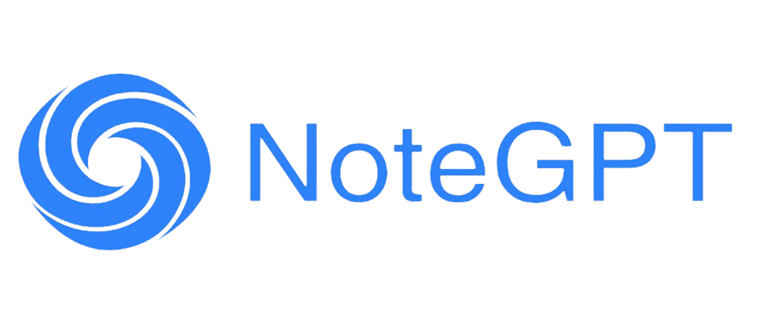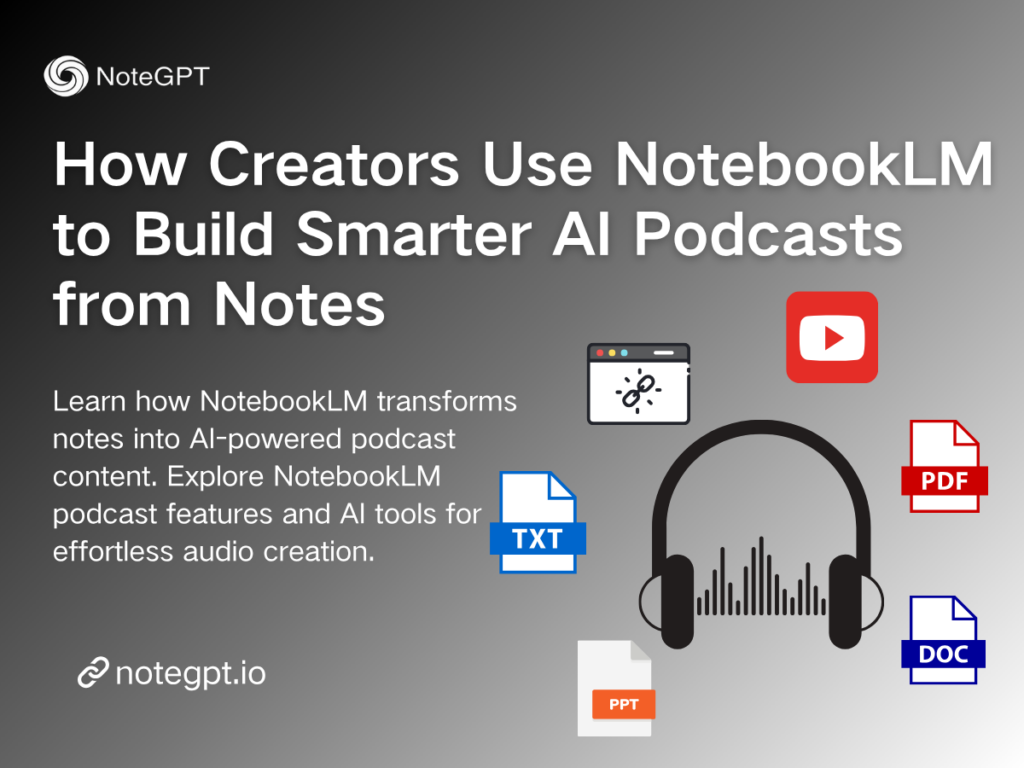AI is changing the podcast game—but are you using it to its full potential?
From summarizing notes to voicing entire episodes, today's tools can turn raw content into polished audio faster than ever. Whether you're an educator, solo creator, or part of a content team, the right AI podcast generator can save you hours of prep—and help you sound more professional while doing it.
In this guide, we'll explore how creators are using tools like NotebookLM and NoteGPT to build smarter podcasts directly from their notes. You'll see real-life workflows, tool comparisons, and which features actually matter depending on your goals. If you've ever thought, "Can AI really help me podcast better?" — you're about to find out.
What Is NotebookLM
NotebookLM, is an experimental AI-powered note assistant developed by Google. As a cutting-edge tool designed to help users extract insights from their personal content, it offers intelligent summarization, smart Q&A, and document synthesis capabilities. Unlike general-purpose AI chatbots, Google NotebookLM focuses strictly on the materials you provide—Google Docs, PDFs, or copied notes—and doesn't pull data from the broader internet. Think of it as your personal research assistant that understands only your library.
But is NotebookLM just another note summarizer? Not at all. With the rise of AI-generated audio content, NotebookLM is rapidly becoming a secret weapon for creators looking to produce smarter, better structured AI podcasts.
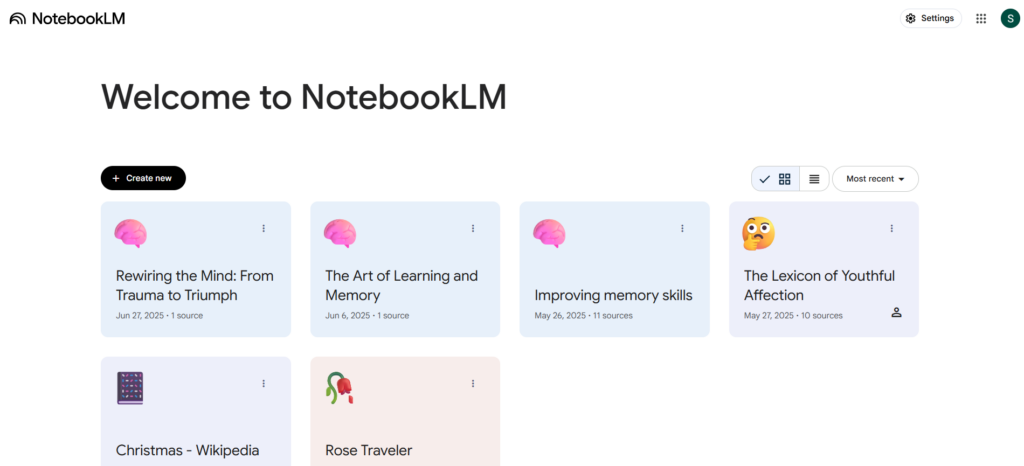
Why It Matters for AI Podcast Creation
Let's be honest: creating a high-quality podcast from scratch is no small feat. Between researching, scripting, summarizing, and structuring episodes, it's easy to get overwhelmed—especially if you're a solo creator or working with limited time. This is where NotebookLM podcast workflows come in and truly shine.
Imagine this: you've collected a mix of research materials—Google Docs, meeting transcripts, academic articles, maybe even lecture notes. Rather than manually combing through everything, you drop them into NotebookLM. Within seconds, it turns your AI notes to podcast workflow into a breeze.
- You get:
- A concise and coherent summary, pulling together the most important insights across sources
- Suggested interview questions and key talking points through AI Q&A generation
- A full episode outline, complete with intro hooks, segment breakdowns, and even possible titles
- Cited sources, helping you reference quotes and guest ideas directly inside the script
What makes NotebookLM audio production stand out is its ability to understand context—especially when you're building episodes that require factual accuracy, logical flow, or multi-source synthesis. You're not just writing a podcast. You're building it on top of layered, intelligent research.
If you're using NotebookLM to create podcasts, you're moving beyond voice recordings. You're crafting notebooklm audio that's structured, searchable, and insight-rich—ideal for turning notes into meaningful, listenable content.
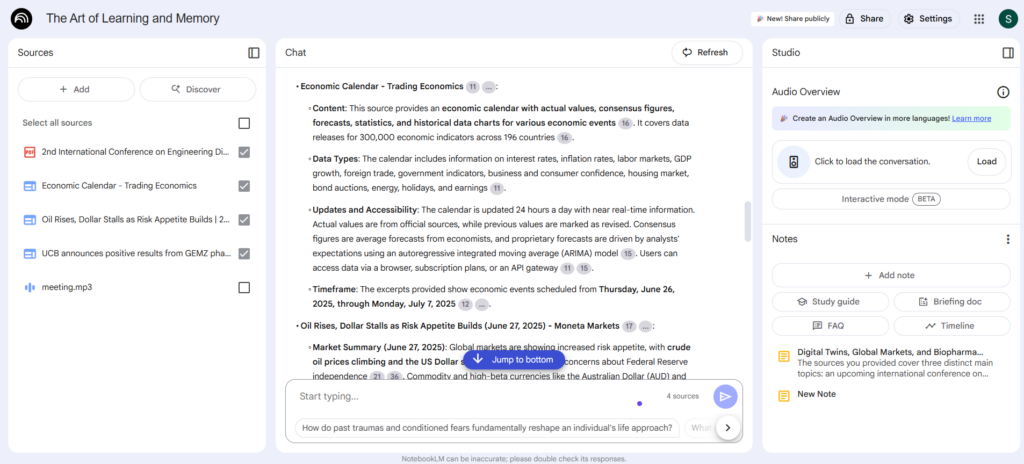
From Notes to Podcasts — How NotebookLM Helps Creators Work Smarter
Whether you're scripting a solo podcast, preparing a multi-host panel, or summarizing research papers into digestible episodes, NotebookLM now plays a more active role—not just as a prep tool, but also as an AI-powered content to audio assistant.
Here's how a modern AI podcast workflow with NotebookLM looks:
- Collect & Upload: Import your source materials—Google Docs, PDFs, lecture transcripts, meeting notes, or YouTube transcriptions.
- Structure & Summarize: Let NotebookLM analyze the content, extract key points, generate summaries, or surface hidden connections.
- Content Shaping: Use prompts to ask for episode titles, show notes, discussion questions, or even scripting assistance.
- AI Voice Output: With recent updates, NotebookLM can generate basic audio versions of its summaries, offering an early-stage AI podcast prototype directly from your notes.
While still evolving, this feature allows creators to preview what their content might sound like as an AI podcast. For more advanced needs—like custom voice styles, language localization, or distribution-ready formatting—creators can integrate NotebookLM with dedicated AI podcast generators like NoteGPT, which offers full-featured voice control, chaptered timing, and multilingual delivery.
Because NotebookLM understands your personal content contextually, it's ideal for building niche-specific, deeply informed podcast episodes—especially when combined with AI voice tools such as NoteGPT, Descript, or PlayAI.
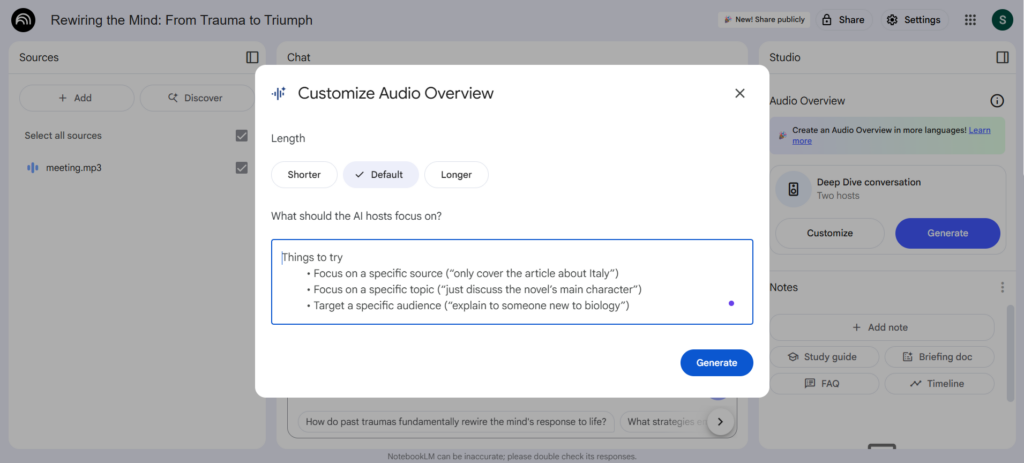
Real Use Cases: How Different Creators Use NotebookLM for AI Podcasts
The beauty of AI podcasting lies in flexibility—and NotebookLM use cases prove just how versatile this tool can be. Whether you're a solo creator racing against deadlines, an educator turning lecture notes into student-friendly audio, or a content team juggling multiple sources across departments, NotebookLM adapts to your workflow. Below, we'll explore real-life scenarios that show how creators combine NotebookLM's multi-file intelligence with tools like NoteGPT to go from rough notes to fully-voiced, multilingual podcast episodes.
Solo Podcast Host — From One File to Full Voice Show
Alex, a solo creator, often works with raw YouTube videos or blog posts. With NoteGPT, they upload a single file—say, a webinar recording—and instantly get:
- An auto-generated summary
- Suggested podcast title
- AI voice narration with chosen style
- A ready-to-publish episode in under 10 minutes
It's perfect for fast, frictionless podcasting. But when Alex wants to prepare a season recap episode that pulls insights from five past transcripts, a few user emails, and notes from comments? That's where NotebookLM shines.
With multi-file context awareness, NotebookLM helps Alex:
- Synthesize trends across content
- Draft an editorial-style narration
- Generate cohesive segments for a longer episode
- Output a clean text version ready for preview audio or export
Together, NotebookLM and NoteGPT become a powerful pair: one for deep idea shaping, the other for polished voice delivery.
Education Podcaster — Turning Course Material into Smart Bilingual Episodes
Sara uploads lecture notes and slides to NotebookLM to find patterns and create outlines that span an entire course. With its cross-file analysis, NotebookLM:
- Finds recurring themes across weeks
- Recommends quizzes or summaries per topic
- Outputs short summaries for students or parents
She previews audio within NotebookLM, then uses NoteGPT to voice the same content in both English and Spanish—selecting a warm, female teacher voice for younger learners.
Content Teams — Collaborating at Scale
For teams handling multiple sources (e.g., research reports, meeting recordings, influencer interviews), NotebookLM's shared notebooks, plus cross-document AI reasoning enables:
- Centralized content brainstorming
- Role-based content input (marketing, editorial, product)
- Shared draft links with audio previews for asynchronous review
Once approved, content is handed to NoteGPT, where producers fine-tune the script tone, voice gender, and speaking language before releasing.
In short, NotebookLM is your AI podcast strategist, and NoteGPT is your AI voice studio. One thinks, the other speaks.
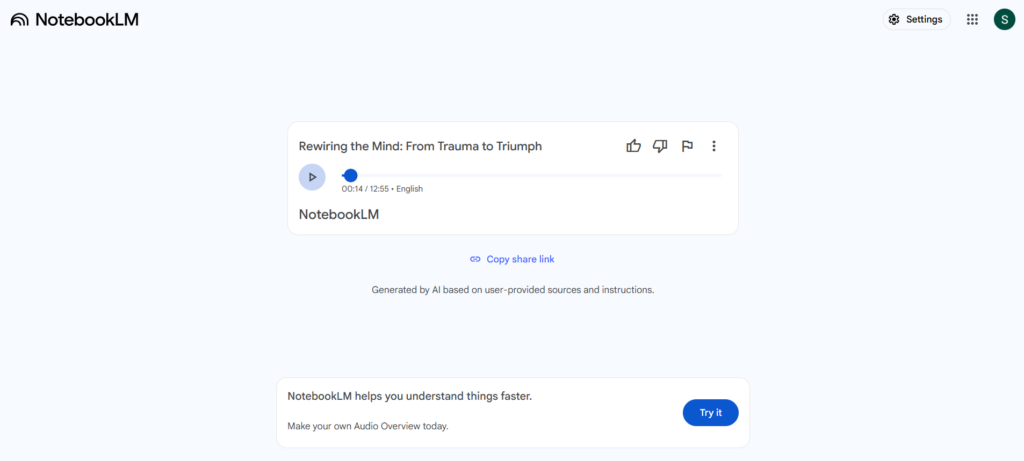
Build AI Podcasts Smarter: NotebookLM vs. NoteGPT and Other Tools Compared
With so many AI tools emerging in the podcasting space, creators are often left wondering: which one actually helps me work smarter—not harder?
Let's break down how four leading tools—NotebookLM, NoteGPT, Descript, and PlayAI—compare when it comes to building efficient, high-quality AI podcasts.
NotebookLM — Deep Thinking and Smarter Prep
NotebookLM is ideal for creators who need to digest, summarize, and synthesize large amounts of information. Its real strength lies in handling multiple files at once, making connections between them, and providing smart insights based on context. It also offers basic AI audio previews and allows users to share links and listen on mobile devices. NotebookLM is perfect for educators, researchers, and content teams who value structured thinking and collaborative preparation before production.
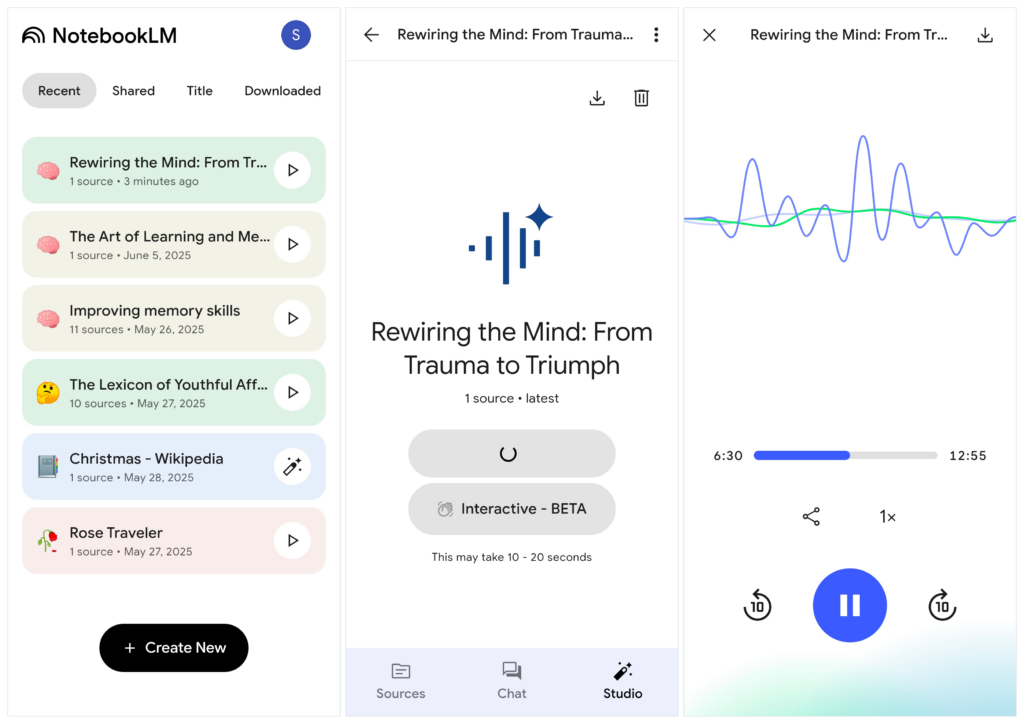
NoteGPT — The All-in-One AI Podcast Studio
NoteGPT is designed for fast and flexible podcast production. Users can upload files—be it YouTube videos, MP3s, PDFs, or meeting notes, and instantly receive a summarized, time-stamped audio version. The tool shines with its ability to customize host, voice style, and language, allowing creators to produce AI podcasts that feel human and tailored. It's especially useful for solo podcasters, multilingual creators, and anyone who wants to go from raw content to a polished podcast with minimal effort.
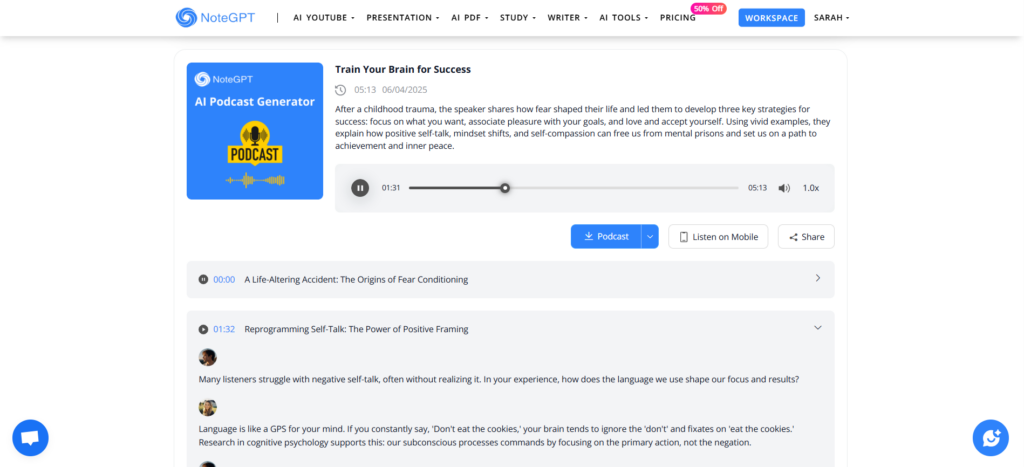
Descript — For Podcast Video Power Users
Descript combines audio editing with a powerful transcription engine. Its standout feature is the ability to edit audio by editing the transcript, making it a favorite for podcast-video hybrid workflows. It's an excellent choice for podcasters who also need video output or want granular control during post-production.
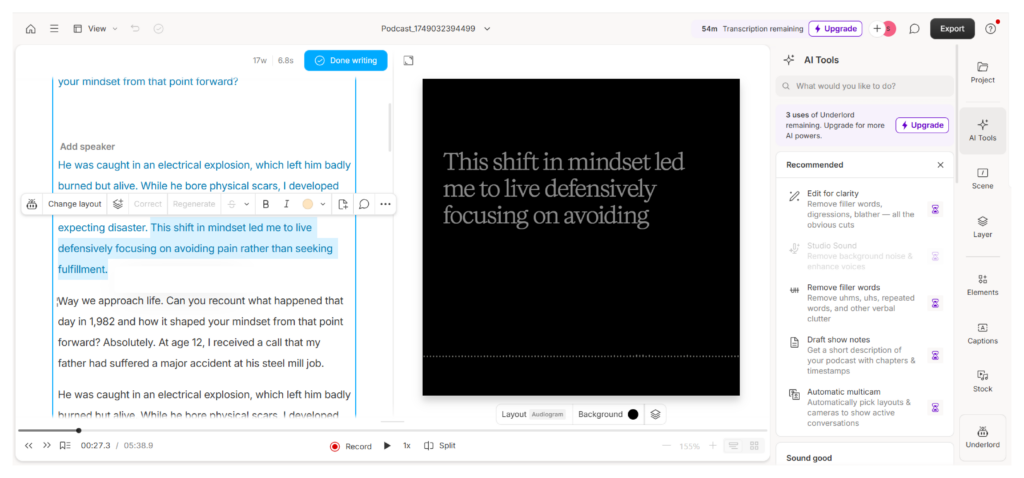
PlayAI — Best for Turning Text into Audio
PlayAI specializes in high-quality text-to-speech generation. While it doesn't support multi-file inputs or document synthesis like NotebookLM, or podcast structuring like NoteGPT, it's a strong choice for businesses and marketers who want to convert written content into listenable formats using various voice styles and languages.
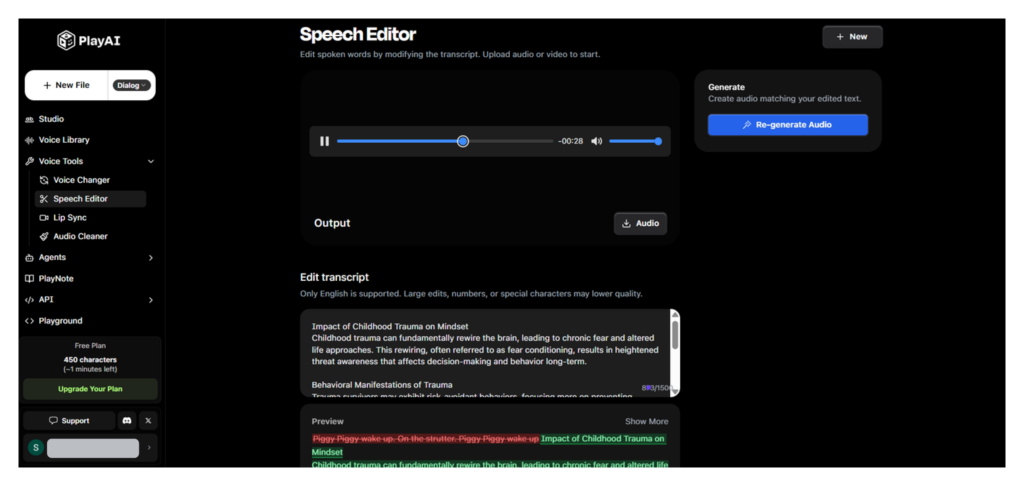
Comparison Table
| Feature | NotebookLM | NoteGPT | Descript | PlayAI |
| AI Note Summarization | ✅ Yes | ✅ Yes | ⚠️ Limited | ❌ |
| Audio/Podcast Generation | ✅ Yes | ✅ AI voice with auto timing | ✅ Basic voice | ✅ |
| Time-stamped output | ❌ | ✅ Yes | ⚠️ Manual | ❌ |
| Multilingual Support | ✅ | ✅ | ✅ | ✅ |
| Best For | Research, prep | Full podcast creation | Editing, basic AI | Text to speech |
Conclusion: Which Tool Is Right for Your AI Podcast Workflow?
Let's face it—there's no shortage of AI tools promising to make podcasting easier. But which one actually fits your creative process?
If you're drowning in notes, transcripts, or research articles, and need a tool that can think like a producer, NotebookLM is your backstage strategist. Its strength lies in turning scattered information into structured, podcast-ready content—perfect for creators who want to build smarter from the start. Whether it's summarizing files, suggesting segments, or surfacing key insights, this is the go-to notebooklm use case.
Need to bring that content to life with voice, style, and different language? Enter NoteGPT—your personal AI voice studio. With customizable tone, multilingual narration, and time-synced delivery, it's the tool for turning outlines into polished episodes in just minutes.
For creators who want hands-on editing, Descript is your digital scalpel, offering transcript-based trimming and post-production tools. And if you're looking for a quick, no-fuss way to convert text into multilingual audio, PlayAI is your on-demand voice-over machine.
Ultimately, building a great podcast isn't about choosing the flashiest tool—it's about finding the right combo. And for many creators, that combo is clear: NotebookLM to organize the thinking. NoteGPT to give it a voice.
Smart planning meets smooth production. That's the real AI podcast advantage.
